#25. Mark Knopfler
The singer, songwriter and guitarist Mark Knopfler was born in Glasgow, Scotland in 1949. Along with his younger brother, David, he co-founded the iconic rock band Dire Straits in 1977. His big guitar-hero moment on Dire Straits came definitely with Sultans of Swing. As opposed to our next guitarist, his key signature is playing without a pick. Another fun fact? He’s left-handed but he plays guitar righthandedly.
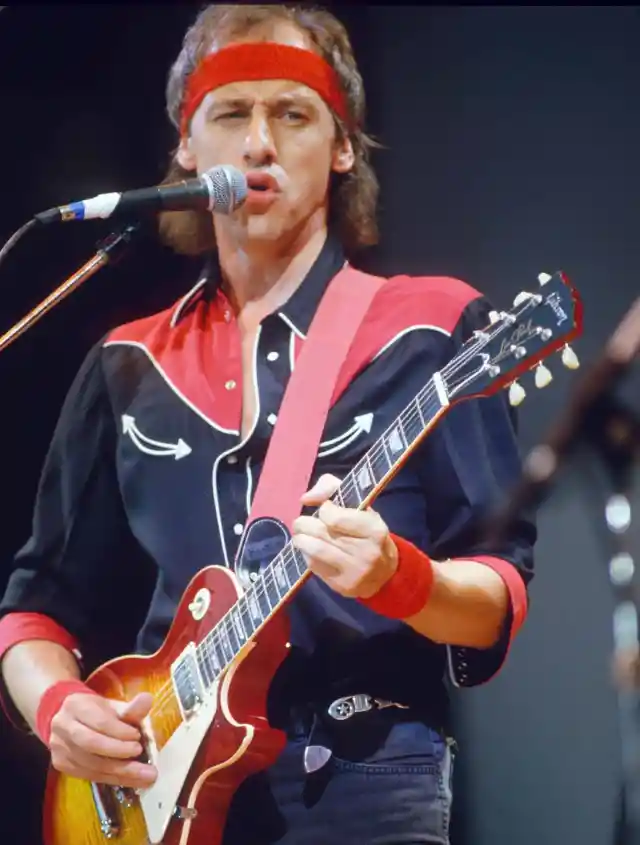
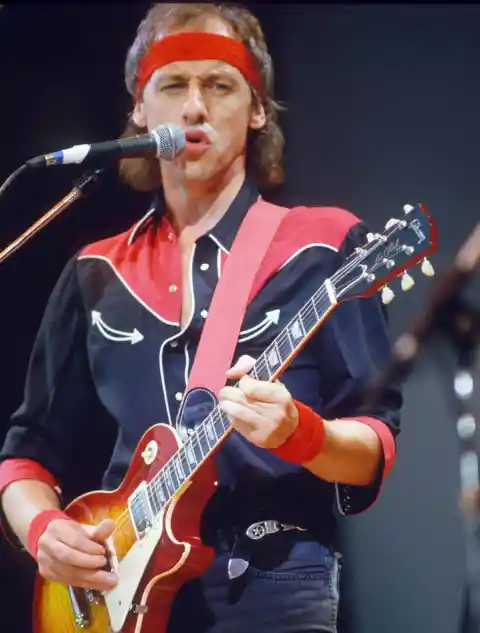
In addition to his role as singer and lead guitarist in Dire Straits, he has recorded and performed as a solo artist as well as collaborating with plenty of A-Listers such as Eric Clapton, Bob Dylan, BB King and Tina Turner. Some of his key tracks are Walk Of Life, Romeo and Juliet, and Brothers In Arms.
#24. Eddie Van Halen
That last name rings a bell, doesn’t it? Along with his brother Alex, the bassist Mark Stone and the legendary singer David Lee Roth, Eddie Van Halen founded the American band, Van Halen. Born in 1955 in Amsterdam, he came from a family of musicians so there’s no wonder he’s such a good guitar player.
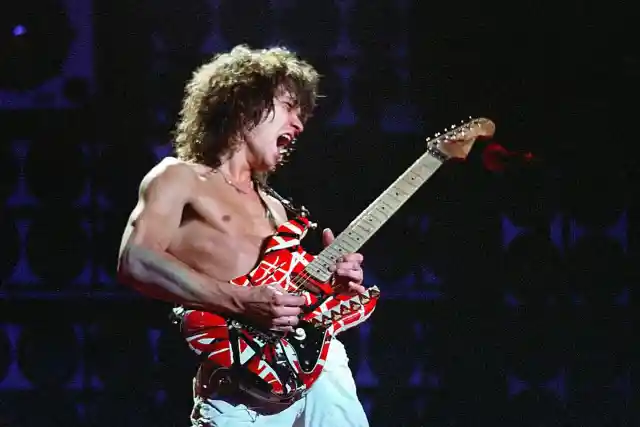
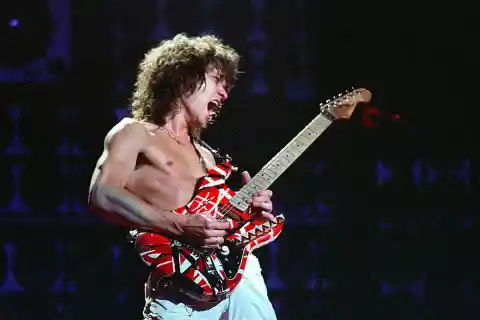
A master of riffs, Eddie also mastered a playing technique called finger tapping, which is basically where a string, as part of a single motion of being tapped onto the fretboard, is fretted and set into vibration. As a consequence, he produces a lot of sounds that may not seem so guitar-ish, like harmonics and other textures. Want to know what I’m talking about? Give Unchained, Eruption, and Ain’t Talking ‘Bout Love a listen.
#23. Jack White
Everyone recognizes the trademark riff from Seven Nation Army, the first single from the White Stripes‘ powerful fourth album, Elephant. The bass-like riff and the memorable chorus garnered the band a lot of attention and the Jack White-Meg White duo became the leaders of the garage rock revival of the 2000s.
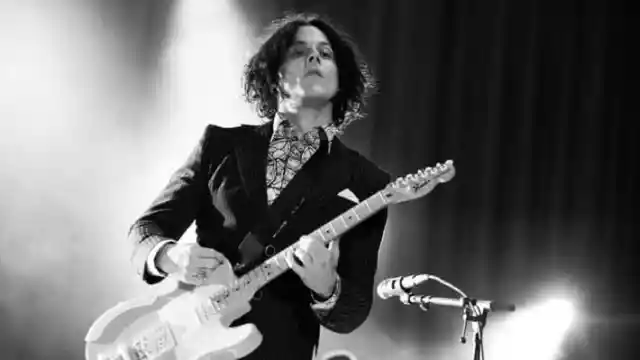
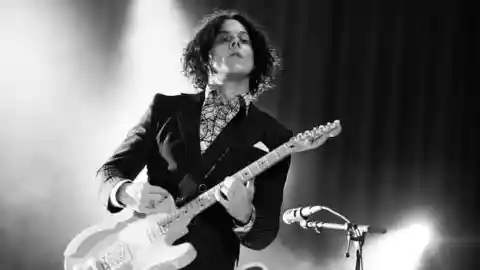
But Jack White’s talent and amazing songwriting skills weren’t displayed only in the Stripes’ exciting blend of blues influence, lo-fi and alternative rock. After the band’s breakup, he kept reinventing himself year after year, with other great bands such as The Raconteurs and as a solo artist.
#22. Angus Young
In fact, Jack’s three solo albums reached number one, and he got really experimental on Boarding House Reach, released in 2018. On the other hand, Angus Young might not have experimented as much as Jack, but his status is definitely enough for him to deserve the appearance in this list. Together with his brother Malcolm, he founded the iconic rock band AC/DC. He’s best known for his schoolboy outfits on stage as well as his energetic performances.
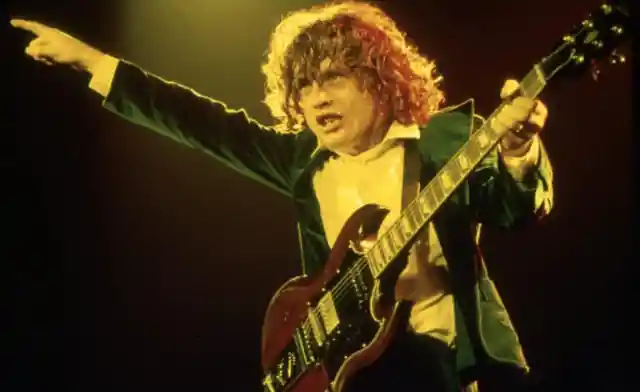
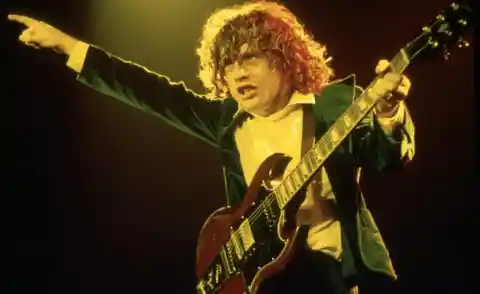
The Australian’s knack for catchy, hard-rock riffs and effortless solos, together with his wild live performances and enormous charisma has been an essential element of rock legends AC/DC. Besides, is there really anybody who doesn’t love Highway To Hell?
#21. St. Vincent
If you’ve never been able to get into AC/DC’s music, Back in Black, from 1980, is the album full of hits where you should start (or else you could try with High Voltage too). To continue with the list we have the amazing Annie Clark, a.k.a St. Vincent. St. Vincent is sometimes associated with indie or art-rock, but she’s one of those eclectic and experimental artists which are impossible to define entirely


During the last decade, several media outlets have claimed that “rock is dead”. Well, it’s obvious that the charts aren’t dominated by rock artists anymore, but a couple of innovative guitarists have kept the sound alive by constantly pushing it forward, and Annie Clark is one of those trailblazing figures.
#20. Tom Morello
Rock’s current boundary-pushing guitarists are known for disregarding long solos as a worn-out resource in favor of using the instrument to create complex textures, while also incorporating elements of other genres, like hip hop or electronic music. St. Vincent not only symbolizes this group of creative guitarists (give her last album, Masseduction, a listen) but she’s also inspired many women to pick up a guitar and start a band.
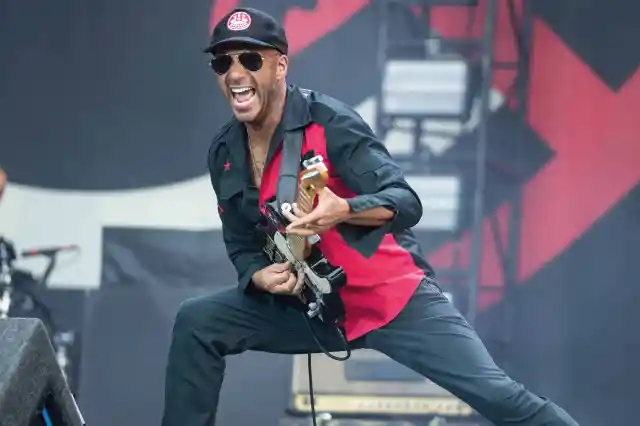
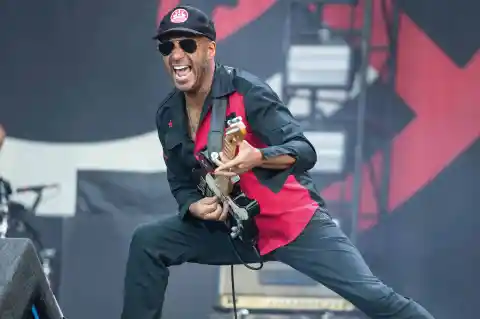
Innovative and open-minded guitarists have thrived in every decade though, and Tom Morello is a great example of this. Combining metal, funk and hip hop, the guitarist from Audioslave and Rage Against The Machine played a crucial role in the rise of the latter in the 90s. The controversial and political band’s impressive success would have been impossible without Morello’s unique merge of tapping, feedback, and other effects.
#19. Keith Richards
Keith Richards has long-since become a living legend, almost a myth. People are often intrigued by his longevity. The man has been through everything: arrests, severe drug issues, you name it. But the reckless lifestyle from his past decades has left no visible harm on him, impressively.
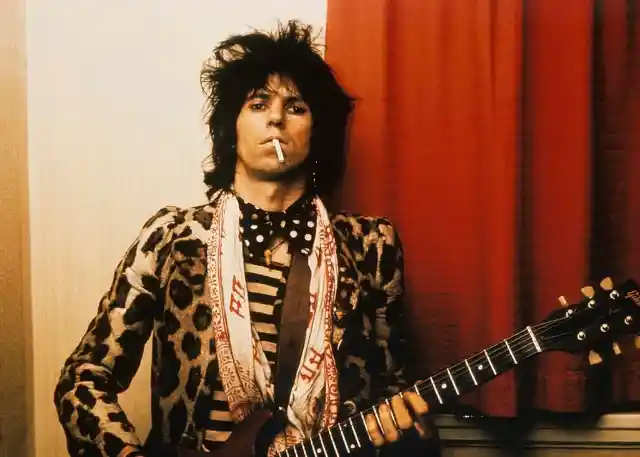
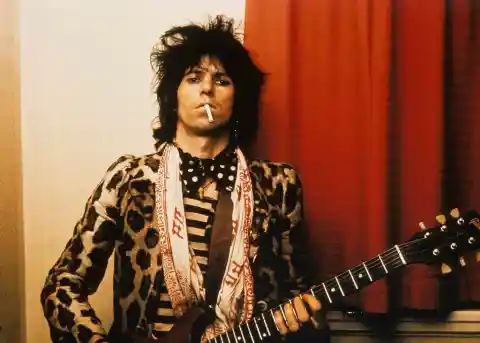
His talent and feel for the instrument are clearly shown in the way he can switch from rhythm to lead parts in the same song, building mesmerizing chemistry with the other guitarists from The Rolling Stones (Brian Jones and Mick Taylor in the old days, Ronnie Wood since 1975). Some of the most iconic riffs have been written by him, including the ones from (I Can’t Get No) Satisfaction, Brown Sugar, Start Me Up, and Tumbling Dice.
#18. Gustavo Cerati
When Latin America’s best guitarist is the topic of discussion, most people tend to play it safe and choose Santana, Charly García and Luis Alberto Spinetta. While no one can doubt their ability, others may argue that Gustavo Cerati deserves the number one spot.

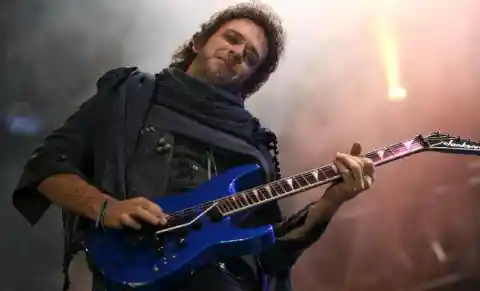
Cerati was the leader of the legendary band Soda Stereo, which created some of Hispanic Rock’s quintessential albums (while Canción Animal is the most renowned, Dynamo is perhaps the most adventurous one). His outstanding solo career saw Cerati’s most experimental facet, displayed with splendid elegance in his second release, Bocanada.
#17. Neil Young
Formerly a key member of Crosby Stills Nash & Young, Neil Young, a.k.a “The Godfather of Grunge” is better known for his unparalleled songwriting abilities and beautiful acoustic tunes. These are displayed in some of his most remarkable hits like Old Man and Heart Of Gold, both from his already classic album Harvest.
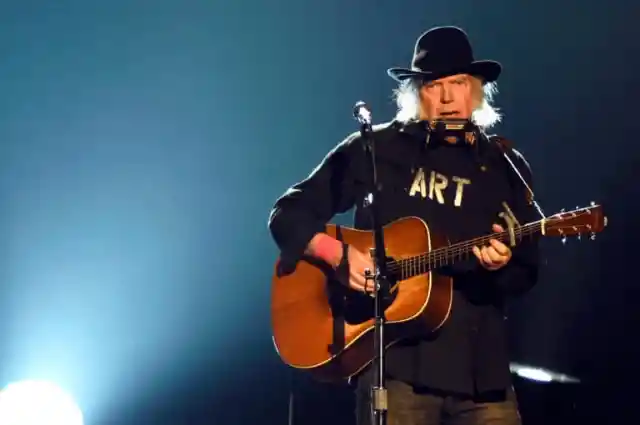

Though critics and fans tend to highlight his unique voice and his melodic facet, the man can definitely shred too! That’s right, if you’re not familiar with his jaw-opening solos, just search for any live version ofLike A Hurricane or Cowgirl In The Sand.
#16. Kevin Shields
Kevin Shields, born and bred in Ireland, is the main composer of the band My Bloody Valentine. The group released one of the most influential albums of the 90s (Loveless), which would then have a huge impact on other alternative bands like The Smashing Pumpkins.
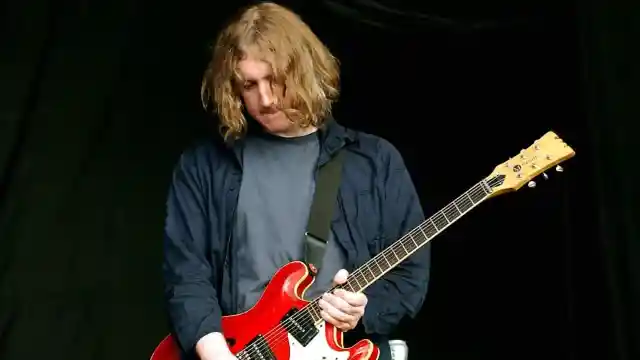

Loveless’ characteristic dreamy, noisy and ethereal sound was mainly driven by Shields’ innovative approach to guitar and melodies. He developed the glide guitar technique, which he also combined with reverse reverb and other effects. Loveless is a one-of-a-kind record that you shouldn’t miss!
#15. Tony Iommi
Though many readers will argue that the previous guitarists in this list are more prolific or skilled than Tony Iommi, he deserves high praise when talking about the most relevant players in rock and roll history.
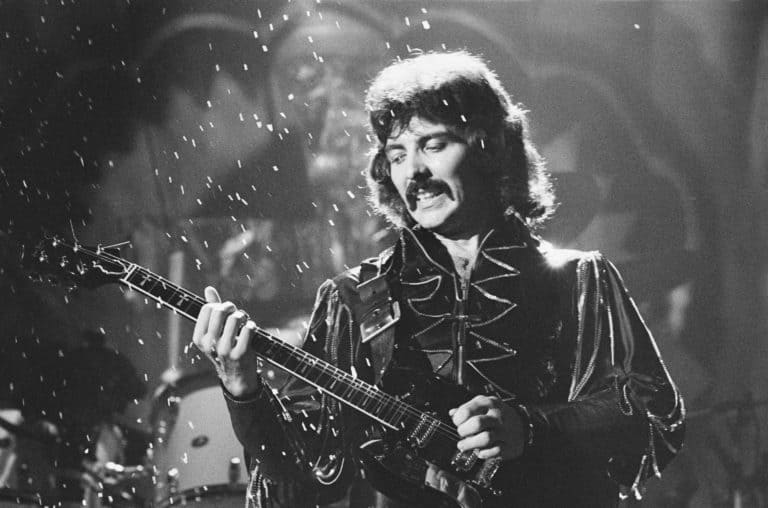

For those who don’t know, together with the iconic Ozzy Osbourne Iommi was a member of Black Sabbath, the band that’s credited with the honor of inventing heavy metal. His iconic dark, bluesy riffs were essential to the band’s trademark heavy style, and the 1970 hit Iron Man might be the best example.
#14. Brian May
Queen is often associated with flamboyant theatrics and an extravagant style. This is true to a certain degree, and the band’s members were all some of the most talented musicians on Earth, hence they had the proficiency needed to pull off complex songs.
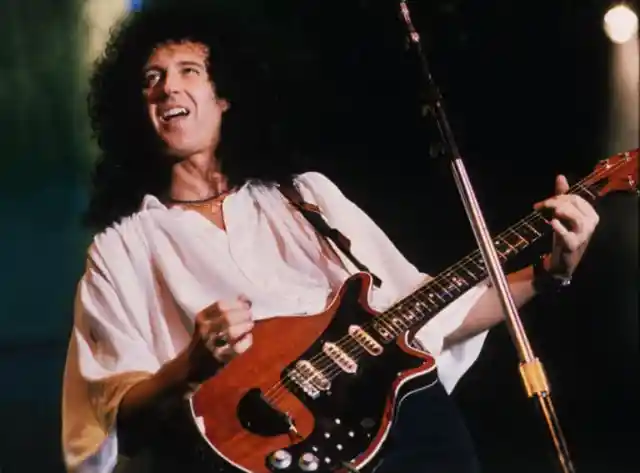
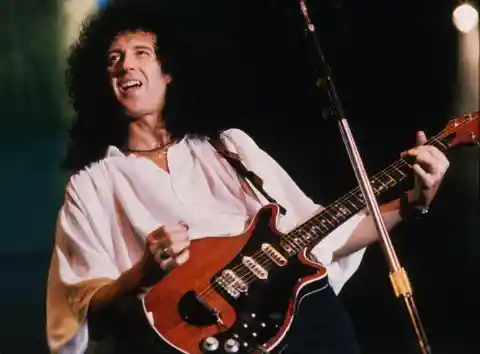
But they could also be catchy, direct and heavy, and this diversity would have been impossible to achieve without Brian May’s impressive guitar work. Looking for memorable solos? Listen to It’s A Hard Life or Killer Queen. An acoustic, laid back ballad? Search for 39, one of the deep cuts on A Night At The Opera.
#13. Carlos Santana
We’ve already mentioned him when talking about Gustavo Cerati. Everybody remembers this man for his legendary Woodstock performance in 1969 (do yourself a favor and search for his live rendition of Soul Sacrifice of that show)… he’s Mexico’s most renowned guitarist.
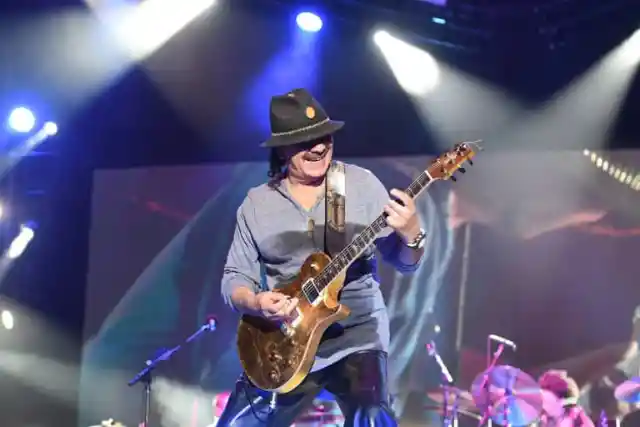
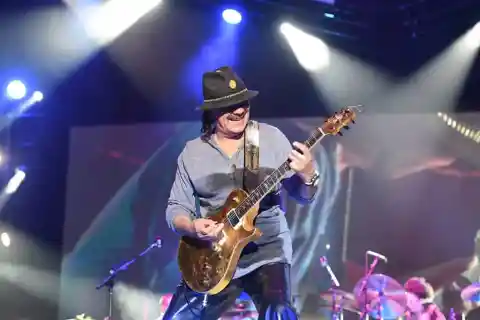
Carlos Santana might as well appear next to the definition of the word legend in the dictionary by now! His most critically acclaimed albums like Abraxas embrace a wide variety of sounds, from salsa and classic rock to African grooves.
#12. Ritchie Blackmore
The hard rock and heavy metal pioneers Deep Purple sure changed their lineup numerous times, but one thing is undisputed amongst their fans: Ritchie Blackmore was their best guitarist. Also one of the band’s founding members, Blackmore constantly excelled at some of history’s most stunning solos.
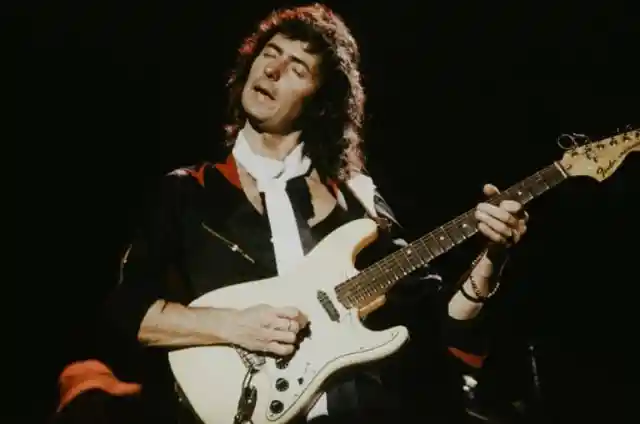
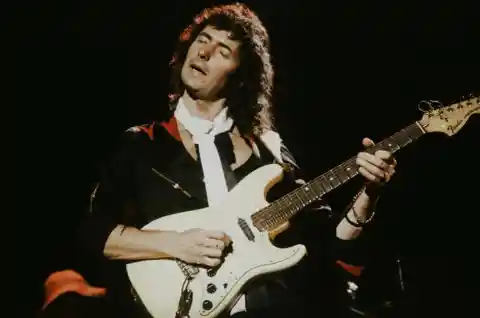
If you think we’re exaggerating, listen to Highway Star, Lazy or Child In Time, some of Purple’s staggering tunes. Blackmore would then start the band Rainbow. Their second album, Rising, was listed as the 48th greatest metal album of all time by Rolling Stone magazine. Impressive, right?
#11. Frank Zappa
How can Frank Zappa be defined? Where to start with his notable and restless musical output? The definition of a musical genius, Zappa was a multi-instrumentalist and a fabulous composer. He released dozens of albums as a solo artist and with his band, The Mothers Of Invention, and they ranged from jazz to rock and avant-garde.
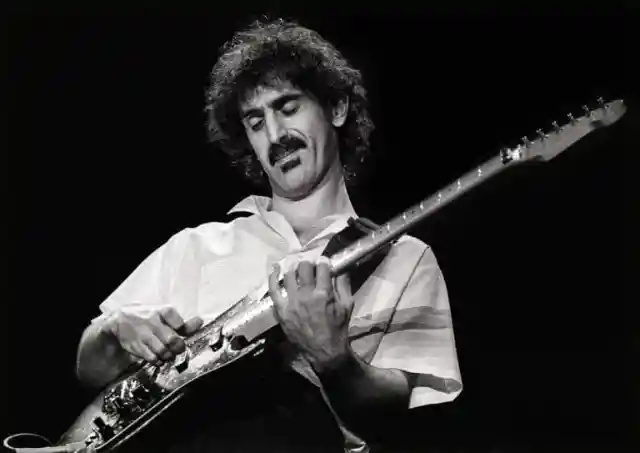
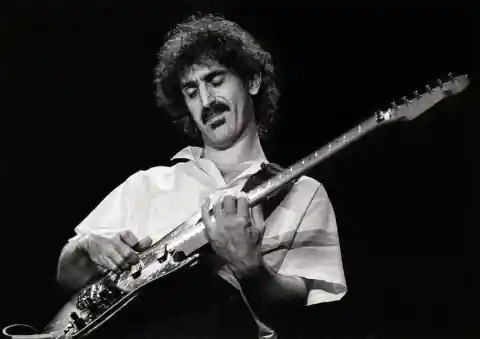
His influences were endless and he often experimented with stunning improvisations during his live shows. Bewilderingly enough, Zappa was a self-taught musician and we recommend you to start with his most accessible classics, like Freak Out! or Hot Rats.
#10. Pete Townshend
Which was the greatest rock band from the 60s? This question is usually answered with The Rolling Stones or The Beatles... but there’s at least one other band that should be included in the debate, and that’s The Who.
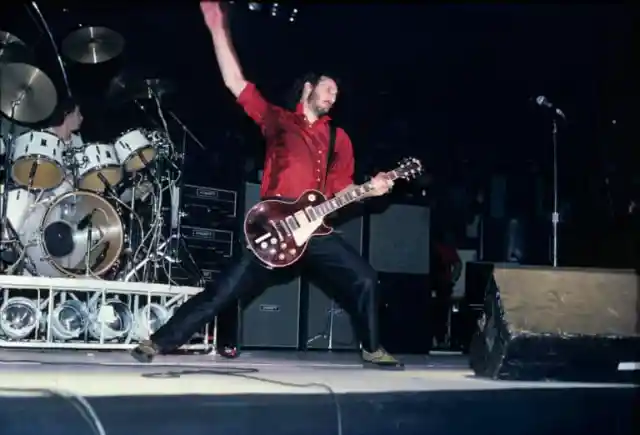
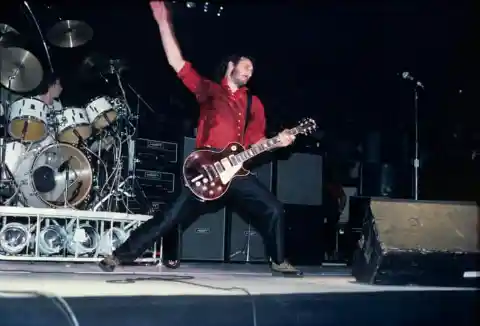
The Who released two of the most astounding conceptual albums of all time: Quadrophenia and Tommy. But apart from these ambitious rock-operas, they also influenced punk with their wild debut album. Pete Townshend’s enormous talent constituted the band’s main creative force, but the theatrics that he displayed during live shows were also famous: he often struck the chords with a windmill-wielding movement.
#9. George Harrison
Townshend, together with The Who‘s drummer Keith Moon, would sometimes destroy their instruments at the end of a performance. George Harrison, on the other hand, was the opposite of flashy. Far from being an ostentatious artist, he was called “the shy Beatle”, and Lennon and McCartney tended to disregard him as a songwriter.
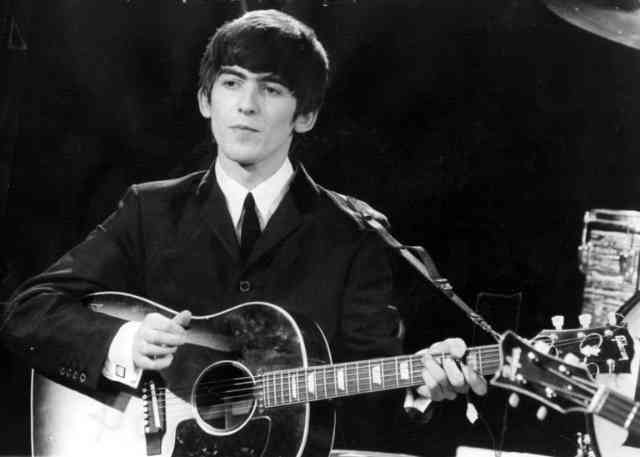
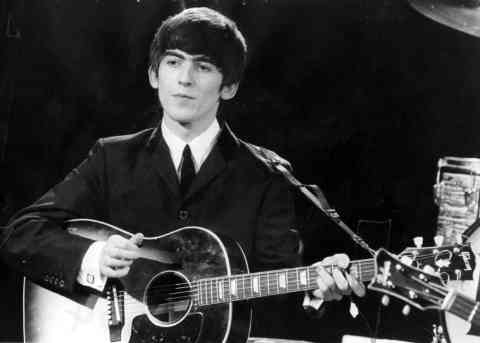
But George ultimately proved them wrong with mindblowing compositions like Something and While My Guitar Gently Weeps. Additionally, George incorporated some elements of Eastern music to mainstream rock, as he played instruments like the sitar on some Beatles’ songs (Norwegian Wood).
“He was never showy but he had an innate, eloquent melodic sense” Rolling Stone founder Jann Wenner told to the magazine.
#8. Chuck Berry
If you’re frowning at our pick for #8, then I don’t know if I’d call you a rock and roll fan… Jokes aside though, maybe Chuck Berry doesn’t have famous albums or solos to which every rock fan returns to once in a while, but he’s probably the most influential guitarist of the genre.
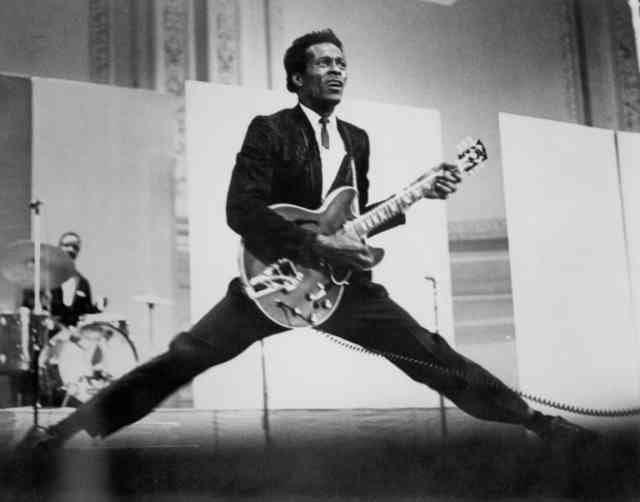
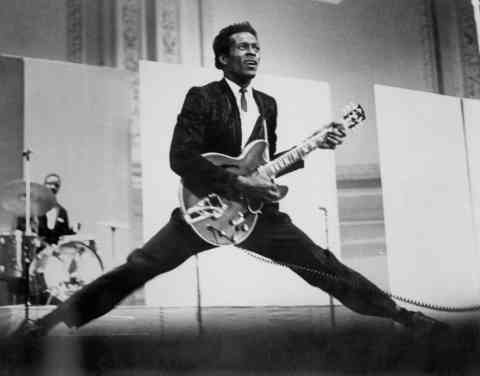
Indeed, each and every one of your favorite guitar players owe something to Chuck. One of the founders of rock and roll in the 50s, he introduced the American audience to a wild combination of blues and rockabilly, full of solos and energetic performances. For his essential songs, listen to Johnny B. Goode, You Never Can Tell, and Roll Over Beethoven.
#7. John Frusciante
John Frusciante was the guitarist and backing vocalist of the Red Hot Chili Peppers on their most acclaimed albums, like Blood Sugar Sex Magik, Californication and Stadium Arcadium. Though the inspiration he draws from Jimi Hendrix is evident on his most electrifying solos (look up Don’t Forget Me Live at La Cigale and thank me later), many fans highlight his emotive guitar licks.


Songs like Hard To Concentrate, Soul To Squeeze and Scar Tissue show him at his most soulful side. Frusciante also has an impressively diverse solo career with albums that range from electronic music to acoustic gems (Curtains) and rock masterpieces (The Empyrean). If you can’t decide whether or not to try some of his solo efforts out, listen to the song Before The Beginning, his beautiful rendition of Funkadelic’s Maggot Brain!
#6. Prince
Talking about virtuous and eclectic guitarists, Prince is one of those guitarists who just has to be in a top ten. Top ten singers? Prince should be there. Top ten songwriters? Prince should be there too. Best guitarists of all time? Without a doubt, that’s the easiest answer.
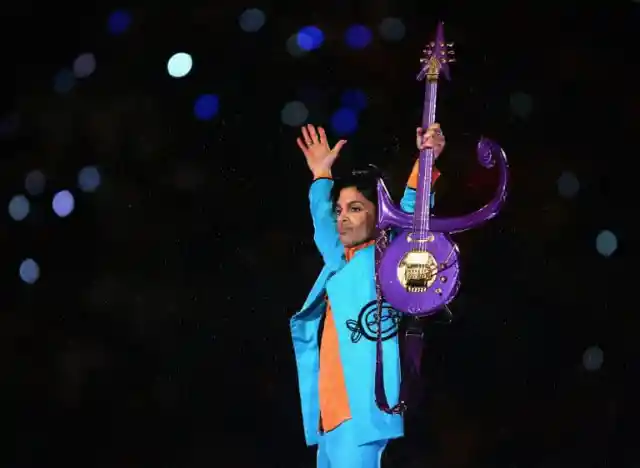
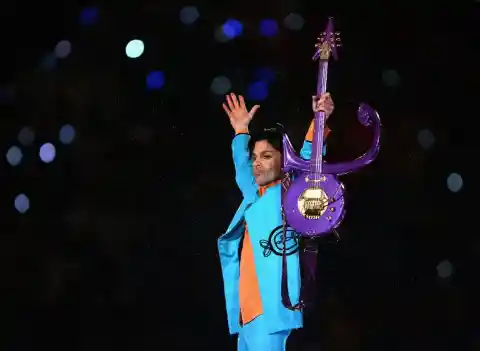
Prince is usually associated with his mysterious persona and his gender-bending clothes and style, but he also made some of rock’s best and most daring albums, which also showcase his shredding ability (Purple Rain, 1999). His solos are rare but amazing, as the case is for the one he played on While My Guitar Gently Weeps, during the all-star George Harrison tribute on the Rock And Roll Hall Of Fame induction of 2004.
#5. Stevie Ray Vaughan
Both a blues and rock and roll legend, Stevie Ray Vaughan’s career was tragically cut short by a helicopter accident. Stevie’s passionate playing, which was equally inspired by jazz, rock, and blues, was hugely influenced by artists from all of these genres.
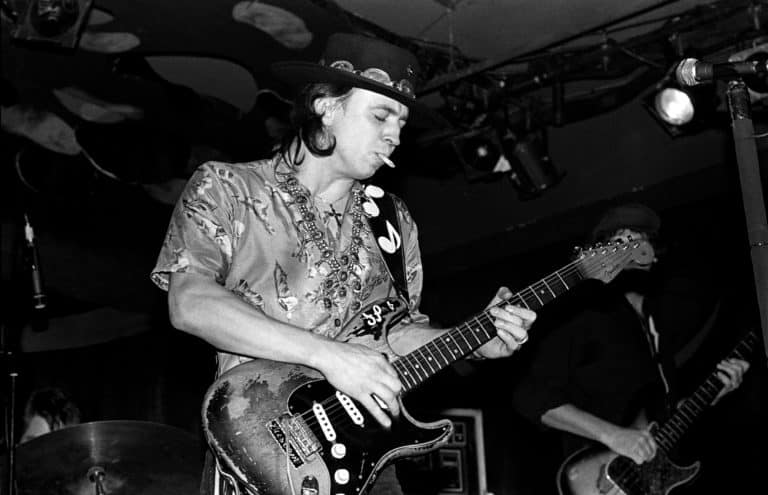

These include Jimi Hendrix, Wes Montgomery, Albert King, B.B. King, and Howlin’ Wolf. As a matter of fact, Stevie probably has the best and most touching Hendrix cover (his nearly seven minutes long Little Wing tribute). Undoubtedly one of the best to ever do it, Vaughan was inducted into the Blues Hall of Fame, and into the Rock And Roll Hall Of Fame, as a solo artist and with his band Double Trouble into the latter.
#4. David Gilmour
Not only has David Gilmour sold more than 200 million albums worldwide with Pink Floyd, he probably has the most stirring guitar solos of rock and roll. Like most Floyd fans, I bet you recall his impassioned performance on Comfortably Numb.
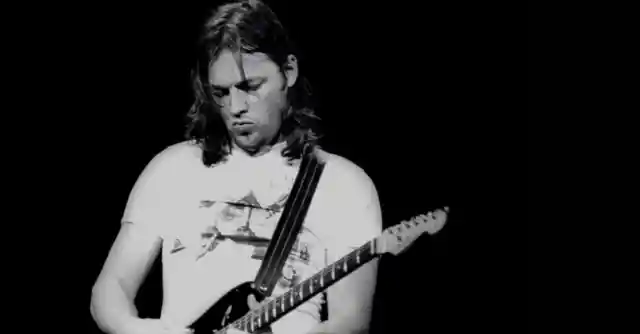
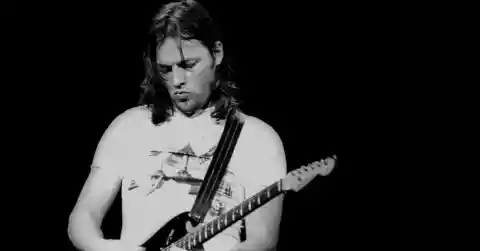
But Pink Floyd’s legendary conceptual albums (Animals, The Wall, The Dark Side Of The Moon) are full of some of history’s most poignant solos: Dogs, Hey You, Time, and Shine On You Crazy Diamond showcase a couple of the most dazzling ones, so give them a listen!
#3. Eric Clapton
I’m sorry to disappoint you if you expected to see the ex-leader of Cream claiming the number one spot, but you’ll probably understand this hot take after discovering our top 2 picks. Indeed, many critics consider Clapton the best guitarist of all time.
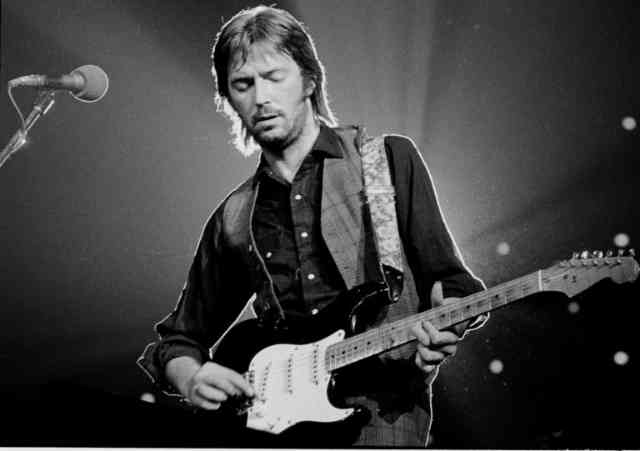
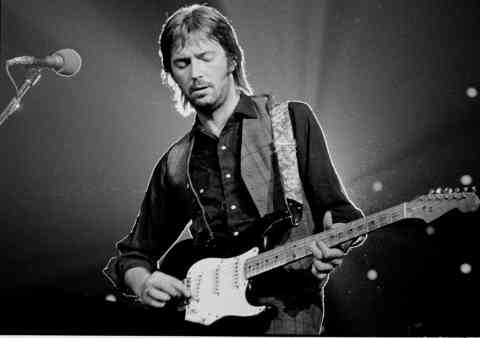
This isn’t much of a surprise really when you consider that he’s been inducted not one, not two, but three times into the Rock And Roll Hall Of Fame! Indeed, across several decades he’s displayed his outstanding guitar skills with The Yardbirds, Derek And The Dominos, Cream, and as a solo artist. White Room, Layla, and Sunshine Of Your Love are some of his most iconic tunes.
#2. Jimmy Page
How can the man who elegantly plays acoustic and electric guitar on the mythical Stairway To Heaven be left out of a top three? Led Zeppelin was arguably the best hard rock band in history, and, though every member excelled at their role, Page’s magical skills and dragon suits constituted a crucial part of the band’s sound and aesthetic.
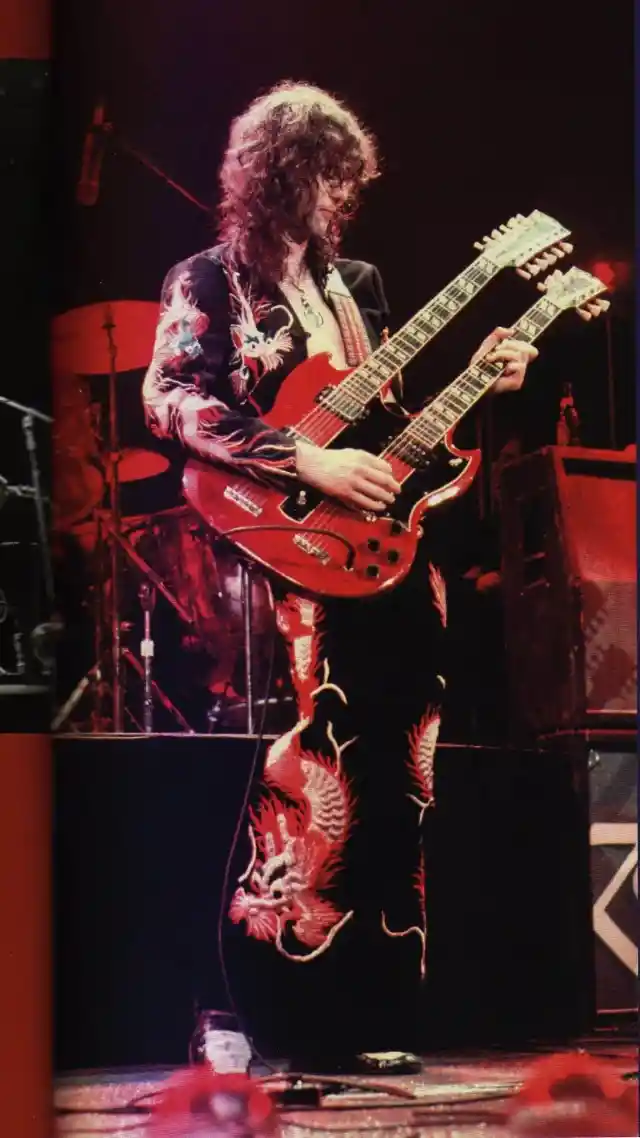
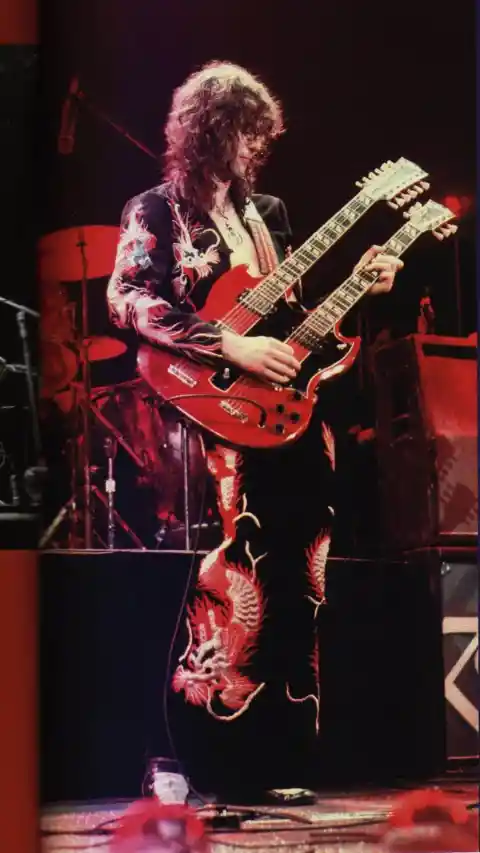
The double-necked Gibson guitar which can be seen in the picture has become one of the genre’s most iconic instruments. In case you’re no Zeppelin specialist, here’s a bunch of recommended tracks where Jimmy shines: Dazed And Confused, Kashmir, Black Dog, and Since I’ve Been Loving You. Don’t miss the following slide to learn about rock’s best guitarist!
#1. Jimi Hendrix
Jimi Hendrix rocketed to stardom, he became the world’s most creative and skilled guitarist, revolutionizing rock and roll, and as if this wasn’t enough, he played Woodstock’s most mindblowing performance, all in just a couple of years. Those unparalleled achievements, together with his early death, may explain the godlike aura that appears to surround his name.
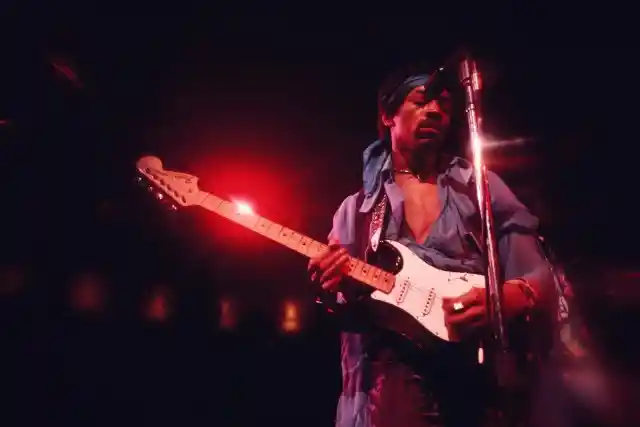
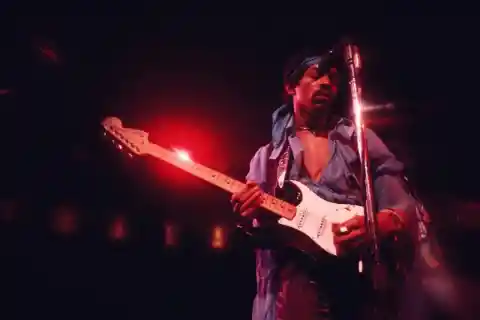
He pioneered and popularized several techniques and effects, such as wah-wah, fuzz tone, feedback, and overdriven amplifiers. The man could even play a jaw-dropping solo with his teeth! Not only did Jimi change guitar playing forever, but he also became a symbol of the Hippie countercultural movement. You still haven’t listened much of his music? Do yourself a favor and give Electric Ladyland a shot, perhaps The Jimi Hendrix Experience‘s most notorious album.